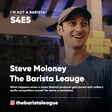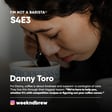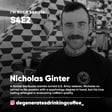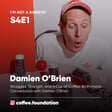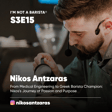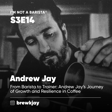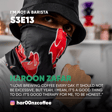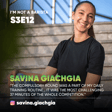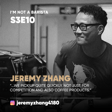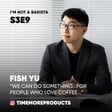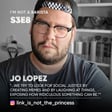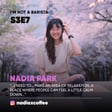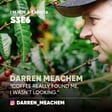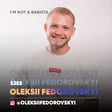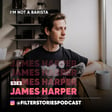Introduction to the Podcast and its Mission
00:00:04
Speaker
Hello and welcome to the I'm Not a barista podcast where you can get inspired by real life stories from the people behind the cup. Join us as we talk about everything to do with coffee from having a career in this industry to brewing tips and how you can support this global community. Humanity runs on coffee and together we can empower the people behind the cup.
Kickstarter Success and Community Support
00:00:27
Speaker
Hello, everyone. My name is Miki, the host of the M Now Burst podcast. And first, I would like to say thank you to everyone who has supported us, The Burying Guide on Kickstarter. With their support, we were able to reach our goal within 12 hours. The Burying Guide Kickstarter campaign is still ongoing, so feel free to go there and support us and please share the project with the coffee lovers you know.
00:00:51
Speaker
Alright, so let's get back to the main topic.
Guest Introduction: Janina Wojkowicz's Diverse Career
00:00:54
Speaker
This episode is about Janina Wojkowicz. You probably have written her story on our Instagram or website, but with this episode, there's more information you'll be happy to listen to. It's going to be a very long episode, so feel free to stop here and there, digest the information, and I'll come back again.
00:01:14
Speaker
Yanina is an IT consultant, an educator who works with companies to scale their business and focus on workforce engagement. On the other side, she is also a coffee roaster, a competition coach, and a brewing and roasting judge. Yanina always enjoys doing things, designing products, educating people, and creating impact.
00:01:36
Speaker
So, let's meet Janina. Hello, Janina.
Janina's Cultural Roots and Early Work Experience
00:01:41
Speaker
Let's start a little bit different today. How about we start from your childhood? Well, I was born and raised in Minsk, Belarus, a post-Soviet country with very mixed culture, absolutely destroyed city on the World War II, so it was all rebuilt in Soviet era, so it looks like this a little bit.
00:02:05
Speaker
And the community is also very, very mixed and diverse. And I mean, it's like, you tell me like Eastern Europe, diverse community, what do you even know about this? Well, that will be partly true, but actually not. The community indeed is all, you know, like,
00:02:23
Speaker
White Slavic people but with very very different background because there used to be a lot of Poles because part of the country was actually Poland taking over in the beginning of the war.
00:02:39
Speaker
And then a very big part was also Russians who arrived afterward to rebuild everything, to build the careers and so on and so forth. And then there were a lot of people from all over Soviet Union because it was like a fast growing capital, Western and so on.
00:03:02
Speaker
So apparently it was a diverse in terms of Slavic people and in terms of background, in terms of culture, in terms of how do we approach work, how do we approach family, and so on. And most people in Belarus would have, you know, like one grandfather from Russian side, Red Army, and so forth. And another part of family, you know, from Polish side who will
00:03:28
Speaker
who will tell you stories how Red Army was actually raping local people and grabbing the food. So it's a very diverse community. But it's a big city, you know, like 90s in post-Soviet countries. It was something indeed, but it was relatively safe. I was lucky to have a pretty good education. I was taken all from what I can take from
00:03:58
Speaker
from school, from after hours, did some piano music, did some dances, played some football with a boy. So I was trying to get what would be raised on the streets, but in a safe environment after school. So I was always doing something. I was always trying to
00:04:22
Speaker
different things. I started my first job when I was 15 and then I was just trying to get another job. It's very hard to get a job when you are 16, but you already have an experience in a CV, but mostly it's of course... What was your first job when you were 15? My first real deal was, of course, referenced by my mother. You cannot just find a job when you're 15.
00:04:50
Speaker
I was working for her CEO. He had a separate office. And in this office, he didn't have a full-time secretary. So sometimes he would need a couple of documents to be typed in, you know, like flowers to be taken care of. Sometimes he would have, you know, some after hours.
00:05:13
Speaker
party, so I would need to come in to go shopping, you know, cut cheese and sausages, like, you know, prepare a table and then come over next morning, early morning or in the evening to actually cleanse myself. So, like, you know, here and there, just on demand, but I think I had twice a week, like, solid hours.
00:05:36
Speaker
and regular work and some just like additional on demand, which was nice because I always have, you know, some, something serious to do after school while other kids would, you know, go smoke, you know, drink beer, spend some money. If they had some, I would go, you know, like I would also go to the center with them. We would take the same metro and they said like, okay, buy guys. I have like a job to do. So I would like, even with them, I was looking cool.
00:06:08
Speaker
Yeah, I did a lot of jobs in my life. I started to work early and I can't imagine myself without the work. And sometimes one job is just not enough. I always do like, you know, a hobby project, a community project, another like research project, something for my own, something for the money, something for the soul. And it's like hard to combine all of all of these bits I manage. And like, I mean, I've been doing this for the first like
00:06:35
Speaker
18 years so I can already know how to combine things and get it all together. I believe your early working experiences since 15 must have a big influence on your life. Many people they start a first job probably after 20 or after university so starting first job at 15 can have a huge impact on your career I guess.
Transition to IT and Early Career Moves
00:07:00
Speaker
Yes, it's absolutely true because at the age of 18, I think, yeah, I still had 18. I was already having a full-time office job as a software testing engineer in IT. After I already quit my job as a waitress in one of the top restaurants and already was, you know, like down, down cruising in my salary basically five times. I used to have
00:07:29
Speaker
you know like in a top restaurant as a sector as a as a as a waitress like with lots of especially if you speak a lot of international languages as i did uh with a lot of you know like business people coming in just get so many tips you get all the best tables you're like but you also learn the communication you also learn the service you also don't like the smile and so on
00:07:51
Speaker
I was like, okay, I think I'm getting a job, like a real job in ISIS after a year, it's like it's still a junior, but it's not even interns, they're going to pay me because I already know something about it. So yeah, out of my $300 per month, I don't grade it to 50.
00:08:12
Speaker
That's a lot, Kat. Yeah, back then for 300 bucks per month, you can afford a lot, but money was never a priority. Absolutely never, ever a priority to me. I was always trying to organize my life the way that it can be earned easily, relatively easily for me. I also look at this like, is it come, is it go? I mean, if it's easy for me, let me as easily spread it to
00:08:41
Speaker
Cause is it a like to something like education social causes call be project collaborative projects and many many more so even now when i'm running my project the small roaster in my basement roasting some competition coffees.
00:08:57
Speaker
and sending it all over. Invoicing is just killing me. Sometimes my clients, after a month selling, okay, we already sold out all the coffees. We want to place a second, a next order. But you still didn't issue an invoice for the previous one. Could you please do? It's like, yeah, yeah, guys, sorry. I mean, now, I still didn't issue one invoice that we're figuring out with one of my very good friends company.
00:09:26
Speaker
in Warsaw, coffee solutions, something that is lasting for like
Challenges in the Coffee Business: Creativity vs. Paperwork
00:09:33
Speaker
year? I mean, we already figured out everything. We found all the... It took us some time to actually find those things. And they are just waiting for the invoice for another month or two. I just cannot do this. I mean, I like doing things. I like to be creative. I like to create products. I like to create impact on people's life, on what's going on around me, but not invoicing.
00:10:02
Speaker
Yeah, you need a secretary to help you with this and there. Could you imagine when you were 15 years old, you thought about one day I ain't gonna be a roast in coffee. What was your dream like before? I'm not a dreamer, you know, like I always knew that it's better to set goals than just, you know, dream big and
00:10:22
Speaker
then one day figure out you're 35, you still dream and you haven't really achieved anything. So I was like, okay, let me dream about something that I can actually achieve in a year or two, which is a nice thing to dream, but actually to rather to consider it as a very big project to see what could be the first steps for how to decompose it to several
00:10:48
Speaker
Milestones and just go step by step so I always have some goals and they are like big but sometimes it's just you know like when you learn to achieve things you just achieve them quicker yeah so you have always been this kind of practical person with the goals right and make a plan and step by step make them happen.
00:11:08
Speaker
Yeah, I think so. I was never like, you know, big dreamer, like I'm, you know, like I want to be an astronaut or like I want to be a doctor or like, I didn't even dream, you know, to help people. I just figured out it's working with people. Identifying those people who want to grow and helps them grow faster is something really nice and cool to do, but I never dreamed of this. So.
00:11:32
Speaker
I'm not a dreamer. I just want to raise things to happen. In each dream, I want to understand, okay, what's the first step? True. And could you tell us why you choose to study IT at a college? Does something amaze you?
00:11:47
Speaker
It also comes back to my roots. I mean, I was born in a place where we already had a personal computer. My father was into those things. He was like department head, by the way, the youngest department has its place ever had. He was always proud about this. And I had an elder brother who was like a computer geek and he's like seven years older. And so by the time I was, you know,
00:12:16
Speaker
able to speak and walk. I already knew how to switch on the computer and switch on my third game and actually play it. So I was always a little bit here and there around it. So it was a natural thing. I mean, even in school when people are just looking at the first computer and the lessons of informatics, I was already doing some like
00:12:40
Speaker
very basic programming things like presentations in PowerPoint, some basic photoshops. I was always a little bit advanced in this. It was a natural thing. I mean, if you know to switch on some new software, try to figure out how it works and actually start working with it.
00:13:03
Speaker
Being a software testing engineer is like, is it be nuts? You just go and start. So that's how I did. I didn't really study much of it. My graduation diploma was in IT management.
00:13:18
Speaker
Again, related to IT management and more IT and economics positions, we're requiring to speak the languages. And it's just like, I speak two languages. I could go and start my university exams in French or in English.
00:13:39
Speaker
And physics, it's like something that I actually need to learn and I have a very big competition. So it's like always naturally look what you already have and see how you can benefit from it instead of just, you know, going a different way and, and, and being like clovers in a mediocre biology, you know, just finding that I'm like, you know, I'm like a water brewing and espresso. I'm like, I'm looking for channelings.
00:14:03
Speaker
work at a channel. I did study some of it, I did work, I did learn most of the things that I learned in my life, I never actually studied them or I studied them as a follow-up to already doing something in this area. I like to do
00:14:27
Speaker
I'm like this self-education person. I like to try things out. I'm not a big of a book reader. It's like, it's very slow knowledge for me and I'm also not listening much. I just like lose focus sometimes. I'm like a very much kinesthetic person. I need to try things out to experience what's good or bad. I need to interact with other people. I need to try to, you know, to write some things and read some things and, you know, like,
00:14:56
Speaker
discuss something, so I'm a big lover for trainings and to try things out. So apparently, I realized that trainings are the best thing to learn from me. I started to learn a lot. I attended hundreds of trainings in my life, from webinars with low interaction up to full day highly interactive, active training.
00:15:25
Speaker
And i apparently started that like i mean there is a lot of knowledge behind how to create a good training things like training from the back of the rooms things how to make the knowledge stick.
00:15:37
Speaker
how to work with one's brain to first reveal what's already known about this topic and so on and so forth. So I'm an educator now just because I used to like to learn a lot. So I also was trying to understand why
00:15:57
Speaker
Some trainings work better and some trainings were not that good for me. Yeah, and trying to understand how to make good trainings and workshops. And apparently I just tried it out and I started to be an educator myself. And this is a very big part of my life right now, both in coffee and in business, to actually conducting several trainings to small groups, big groups.
00:16:23
Speaker
massive groups to facilitate the events and just make sure that everyone is engaged, everyone is interested in what's going on, everyone understands what's going on, everyone benefits from it, and just make the knowledge stick, let them just go and do this the next day. So bringing all that experience and knowledge that actually came from a dozen years of experience of my life,
Role as Agile Coach and Workforce Improvement
00:16:50
Speaker
into coffee education made me the favorite trainer of everyone who ever trained with me. Before jumping coffee, could you tell us more about what is your another job, your real job in life now? We already know that at 18 years old, I started in 19 and it's been 15, 16, yeah, 15 years of experience in IT.
00:17:15
Speaker
At the moment, I'm what's called an agile coach. This is a pretty innovative job in IT and business overall. It doesn't have to be IT only, which allows companies to scale, scale in size, scale in people headcount, but also scale people in business dramatically.
00:17:39
Speaker
with engaging more people, making their work more effectively into small teams, increasing the involvement, the motivations, the collaboration, planning. And for business, it's faster return of investments. It's better retention with people. It's also
00:18:01
Speaker
growth in putting the right targets, putting the right goals and achieving them faster and quicker. That's my main job. I'm part of the consulting team, but I'm also like a solo person. I did quite a lot. So this is basically an accumulation of great other jobs that I've done in this area.
00:18:25
Speaker
And I also work all over. I mean, pandemic times were actually even good for me because people started to have challenges in businesses, like how to make people engaged and collaborative at home.
00:18:41
Speaker
I mean like we used to be in an office we used to see each other like what's now so I had a lot of works these days and others and these also do a lot of trainings in the area like it could be weekend trainings evening trainings but also it's like wartime trainings corporate formats public formats so a lot of people from all over the world because I teach in Russian and in English
00:19:08
Speaker
So basically, I'm consultant educator and I'm working with businesses to scale their businesses with a focus on people involvement. So it's very brief. That's what I do as my full-time job for the past five years already.
00:19:28
Speaker
I think for many audience must be very interesting to hear that you real job is a business consultant and it's very, uh, dealing with a very complex problems with IT and well, can I imagine that, but thanks for
Discovery of Specialty Coffee in Prague
00:19:43
Speaker
sharing. So let's talk about coffee now. How did it happen? Like one day you went to somewhere and, uh, had a great cup of coffee. What is this? Why is no beer?
00:19:52
Speaker
Or what happened? It actually happens, I think, in Prague. I think it was in Prague in Czech Republic, around six years ago. And apparently, we dropped into a lunch place with coffee and tea. I used to drink more tea.
00:20:12
Speaker
I didn't really drink any coffee, just because I thought that latte is a coffee and it's bitter, ugly. Apparently I was allergic to milk and I was just like, okay. It just didn't work with me and I quit any kind of coffee at the age of 20 something. So we are sitting in the shop having a nice soup or there's a pot of green tea.
00:20:37
Speaker
And on the table nearby, I see a very nice shape of this Kerios server, which people see for the first time, it just attracts attention. And I see something in there, like a liquid, which doesn't really seem like a black tea to me, and it smells nice. Okay.
00:20:57
Speaker
I want to try this out. So we ordered the coffee. What is that? I mean, I wasn't like, you know, such a great sensory nose and as I am now back then, but I liked, you know, nice food, good green tea. So I already was able to identify, you know, basic taste and basic aroma groups.
00:21:19
Speaker
Okay, coffee is supposed to be strong, bitter and dirty. And this is a clean, very nice body, very aromatic beverage. It's almost like a wine. It's just in the middle of the day. What is it? And then it was like, I think a couple of months back, I found it in Minsk in my hometown.
00:21:46
Speaker
There is a first coffee shop who actually do something like this. They also have those Hario servers. So I drop by, I order the coffee. So it's like Ethiopian coffee because Barista advised. I like it so much, I come over and I order a second one. And they make me a second one and it tastes absolutely different.
00:22:07
Speaker
Can you imagine if you ordered the same coffee? Yeah, it is the same coffee, but you have two different baristas who have zero knowledge because no one has any knowledge in the market about this. And they just bought equipment, bought beans, and I think
00:22:25
Speaker
someone explains them that tried to make it, you know, 15 to 250 and just pour it a couple of times. Now I understand that depending on what is the total time, what is the grind size changes could happen, what are the pouring techniques, what is the temperature of this, and like many other factors would indeed changes taste dramatically.
00:22:53
Speaker
And back then, it was just like, how can this happen? I'm just ordering that same beverage. But kill me, it's different. It's not the same. It's not that tasty. So I started to ask questions. And apparently, after the third question, I'm like, OK, I'm an IT person. I have an analytical mind. I dig very deep. I ask a lot of questions. I ask hard questions. Because in IT, we just speak like robots, like hard questions, hard answers.
00:23:21
Speaker
And apparently, a soft-skilled young person as a barista just have absolutely no idea what to reply. And I clearly see that they don't have both self-confidence or knowledge behind what they are saying right now. Like, okay. We've never seen any customer like you. I need to dig deeper. I need to find this out. Yeah, it's getting interesting. There should be someone else in this world who actually knows anything about it. Yeah, it starts to get interesting.
00:23:51
Speaker
With all my geekiness that I could apply to this, it starts to be found through one coffee school in another coffee school in Maine.
00:24:03
Speaker
third coffee school. Apparently, there were three coffee schools. It means each of them had a couple of hours lesson on brewing, which was something like, okay, let's open the YouTube video about AeroPress.
Pursuit of Coffee Education and Events
00:24:16
Speaker
And this is AeroPress, and let's just do the same. So yeah, and then you realize it's okay. Let's travel. Let's see what the world can offer. And then there's like, I see courses.
00:24:29
Speaker
Bruin Foundation in Netherlands. Then Bruin Intermedia had actually organized it in Minsk with a Polish ancestry British trainer who just got a certification and was quite happy to travel somewhere interesting. And I called around all those people who were teaching this material in the school that I graduated and say, okay,
00:24:54
Speaker
I'm doing a training about this, who is an advanced skill trainer from the UK. Let's just go for it. Unless you have a group, he won't come. And unless you agree, there is no one else in this country. So we did a group. And he came and it was like SCA brewing intermediate with like
00:25:13
Speaker
What? Refractometers, TDS, extraction, all that weird stuff. And then I'm buying a refractometer, obviously. I mean, I'm a geeky person. There is something to measure. I just need to start measuring, right? So I'm buying through him and a refractometer. It's the first refractometer in Belarus, obviously.
00:25:37
Speaker
So I'm just walking in, and it's already a couple of coffee shops by that time. So I'm walking in a coffee shop, order two brews.
00:25:47
Speaker
And then what I did basically is trying to say to myself what I think about it, like in terms of how strong the beverage is, and then measure it and see if I'm right or not. So basically this is how I trained my tongue refractometer that can be 005% precise about measurements. So after this, I just didn't need one anymore, but it was like an extensive training.
00:26:15
Speaker
In some coffee shops, I just sometimes, you know, could drop in with a friend, you know, just, you know, to introduce to the coffee and just speak and had some nice chat. And I would say Barista who would go backstage and say, I'm not going to put coffee for her. No, no. It's her again. Right now, but I'm not doing this. So there is a head Barista coming over.
00:26:42
Speaker
whose shift is already over, she dresses back to brew me a coffee because the other one is scared. So can you imagine? I just came to have a coffee. It must be so serious. I wasn't. It was just that girl who knows everything.
00:27:04
Speaker
And I was that girl, I was like, okay, it starts to get ridiculous. Every coffee shop they know you. Exactly. That's how it did. So it started to get ridiculous, but it also started to be a big social pressure. If people are scared of you, that's a very bad sign. That means that you need to find out why. And it's obvious why, because you know more than they know in their professional area.
00:27:30
Speaker
So it's my social responsibility to grow them. Yeah, exactly. And I absolutely didn't want it. I didn't ask any questions after that first time. After that first time, I understood everything about the market. I had good analytical skills. I was basically the one answering the question most of the time. So those people, baristas, who know more easygoing, more like
00:27:58
Speaker
They knew that they could brew something to me, ask for my opinion. Most of them were happy if I sit at the bar when I can see how they brew it, because they could benefit from it and actually improve their brew. But this is when I started to do events. I started to do massive cappings, let's say, like I'm traveling somewhere.
00:28:24
Speaker
Let it be a Czech Republic, I buy coffees from different roasteries. I do, I come back, I do an event. It's always, you know, like 20, 30, 40 people who are, who are coming. We're tasting together, we're discussing, and like, I, I get myself some, you know, weird interesting brewing device, such as a 21 from Australia, as it was like, no.
00:28:50
Speaker
It was great for me back then. It's interesting, it's big. I make a public presentation so everyone can come over, brew it, and so on. So I started to gather people around me more and more.
00:29:06
Speaker
And then I think we made a first kind of small festival that already gathers, you know, like a hundred people. And then I organized the first Aeropress competition. And then I organized a first Brewers Cup kind of competition because there was no Brewers Cup in SCA, only Baruch Talat Yard, that kind of stuff.
00:29:35
Speaker
I imagine them announcing a Brewer's Cup next day. No one's going to sign. They have no idea how to do this. They are scared. No one has three scales.
00:29:45
Speaker
Literally, in that country, you cannot find one person with three same scales. And the coffee shops, brewing setup would be the will fast walk for 100 euro as a grinder. I obviously know EK or anything like this. And you're like two servers. Some were just, you know, like cheaper wine bottles from local glass store, 2v60.
00:30:13
Speaker
And that is. I mean, like the cheapest kettle, of course, without heating, so they would use how it looked like. And I think it was great. It was pretty simple, right? We all started from somewhere. I think it was great because they were actually learning something. They were learning it's like, you know, just boiling water is one thing and like not boiling water is another thing.
00:30:36
Speaker
The grinder is not perfect. You have really big pieces of coffee, but then the filters are stuck with some final parts. I mean, I definitely advise everyone to hire a Belarusian barista. If they are in Russia, in Ukraine, in Poland, there are a lot of Belarusian people now living in the country because of the political situation, just hire a Belarusian barista. That person would know way more than your local one.
00:31:04
Speaker
who started with nice scales, beautiful kettle, you know, a YouTube video. Those people actually did a lot of job to figure out this thing. So, yeah, I did quite a lot of activities for the industry, for the community. There's like a lot of people who, you know, just were students or like didn't work in coffee, absolutely. But they were somehow nearby. They were attending some cuppings.
00:31:34
Speaker
This and that, and apparently they did a career in coffee. They participated in some battle, they participated in an error press, and they apparently participated in this brewing something. And then they felt that they are ready to go and actually work in a cafe for part-time as a student.
00:31:57
Speaker
And they were doing a great job and they were going to attend another competition. So there were people who actually started the career and made the career with those activities that I recognized. And I'm really happy about this. My time in that place was over. Even when I was already
00:32:16
Speaker
Me and my husband were already out, we were already based in Poland, and I had a lot of troubles because I still had clients. It was my main work. When I started to work in consulting rather than full-time, I had clients in Russia, Ukraine, Belarus, but then some in Germany and that part, and I was touring.
00:32:38
Speaker
Because there is no direct flight, let's say, from Ukraine to Russia. So I was organizing the tours when I fly from Poland. Let's say I fly to Ukraine. Do a quick customer, maybe attend a couple of coffee shops, then come to Belarus. I still had a place to stay, a lot of stuff.
00:33:01
Speaker
I would rest a little bit, have one job, rest another bit, have a second job and then go to Russia and from Russia, absolutely tired, come back at home, rest for a couple of days in my bed just without even trying to get out of the bed and then it's the next part, it's like the western part. Germany to Austria, sometimes to Amsterdam, sometimes by cars, sometimes by planes.
00:33:27
Speaker
And in my trips to the western part, my husband was happy to go with me. And to the eastern part, he would always say, can you deal without me? Okay, good girl, go. So it was one or two years of extensive traveling. I needed to calculate my
00:33:49
Speaker
I needed to show them actually how they spent my last two years and where. So I needed to calculate every night spent in the European Union outside. And I didn't like what I saw. You must hate it. I had to figure it out, found all the tickets, all the
00:34:09
Speaker
notifications. But then I was like, okay, those two weeks, I don't understand where I've been. So I needed to scroll my phone pictures. Okay, I was actually in Belarus for two weeks and did zero pictures. But I think still everyone in Belarusian coffee community would, who are there for more than a year or two, but even those would hear something about me. So
00:34:37
Speaker
I don't even know who I am there, but there are people who hate me, there are people who love me, and there are people who learn from me, and there are people who just, and imagine me, I would just like, you know, just out of the train, just nearby a coffee shop, just drop, you know, to take a filter away. And I come in and suddenly the barista behind the bar just, you know, stop smiling, become stoned, and then smile again and say,
00:35:07
Speaker
I know. Oh my God, come on guys, just put me a coffee, ask me questions if you like. I can even share some beans I have with me, so just easy. Yeah, so it was... I would like to see that what's happening in a coffee shop. Yeah. During your past experience and you travel a lot between east part and west part, what would be the biggest difference in these two communities or two areas?
00:35:34
Speaker
The difference is really massive and even between European countries, I would say the difference is massive because we would have different roasting styles, different consumption culture. There are long consumptions, coffee culture with traditions such as Norway or Sweden or Finland who actually contributed to the world's filter coffee or like Italy who would
00:36:02
Speaker
who make it really hard for specialty roasters in Italy to change anything because it's just, you know, very hard to work with this culture. But these are cultures which were built quite fast and quite recently. They are easier to change, but they also do not have certain standards. And I would say that similar things would happen to Eastworld as well. For example, Russia,
00:36:32
Speaker
I always say to whoever I meet in Europe that one of the strongest
Exploring Russian Coffee Culture
00:36:40
Speaker
coffee cultures and the highest quality of coffee production, brewing, competition level and so on is in Russia.
00:36:50
Speaker
They would not believe me because they don't know a lot of Russian baristas or roasters just because it's a closed market. But then thanks to Vladimir and Arseny, I could just throw in their names and ask, do you know who are the last two world coffee roasting champions? So imagine if there are like two of them in a row, what's happening in the whole industry.
00:37:16
Speaker
Quickly, I had most of the specialty coffee roasters, and we have speak hundreds of them in the country, would produce specialty capsules. How about that? Or dream bags, and they've been doing it for years.
00:37:32
Speaker
And you just look at the trip back for the first time in your life and you have no idea what it is. And I bet that if it's produced here locally, it's also very poorly roasted and ground because people over there would experiment for months and like multiple batches before they release a product.
00:37:51
Speaker
because they actually work on product development because there's a huge competition in the market. I would say that the rise of the culture would be like 10, with more years back. Russia back then was a very, very, very rich country. And that would be just everywhere. I mean, like if you have massive money in some areas, you know, like
00:38:16
Speaker
a banking or production, you know, the metals and everything, sources. You have, you know, the pieces of manages thrown everywhere. So this is how many roasters
00:38:30
Speaker
set up the roasteries. So they started way, way longer back. So their experience right now is massive. Their production is not a hipster project. Their production is a business with processes, with clients, with deliveries. And your poor Russian roasteries, if you are only roasting two tons per month, like really poor.
00:38:56
Speaker
hundreds of them again and some words you know there are productions with a couple of roasters with you know 60 kilos 12 kilos and like some more like and they know how to operate it because they've been doing it for a long time well for example in the cranes it's not the case because the rise of coffee
00:39:17
Speaker
industry and this specialty coffee culture started way later. Generally speaking, the amount of money in that industry was way less and smaller. It's only now that we would see some really great projects like Takava Cafe, for example, who have massive investments, who open up really big, bright, and very well-equipped spots
00:39:45
Speaker
with great baristas who have a very long experience in the industry because they were basically the first ones. But generally speaking, if you walk, let's say, in an Ukrainian city, let's not stay here, but let's stay, I don't know.
00:40:02
Speaker
Harker, for example, I've been there with the training a couple of years back. We were just walking, you know, like there are coffee shops popping up and there are people behind the bar who have no idea how to resist coffee. And I would just say, okay, just follow what I say. And he would brew a Chemex and try it and say, wow, it's really way better. Wow. Because someone would sell them beans equipment and give them
00:40:31
Speaker
weird recipes like with ratios 1 to 15, very fine grind, including stirring in the bloom and it's like so estrogens and so heavy to drink. I mean, like absolutely no sweetness. People in Ukraine, they just are not scared to do businesses and startups. They do it easily without worrying about like, oh, do I know enough about this industry? Like in Belarus, for example.
00:41:00
Speaker
In order to actually start working or start a business in Belarus, you have to be absolutely sure that you have all the necessary equipment, all the necessary knowledge you're already
00:41:12
Speaker
world's competitor and then you probably are good enough to open a coffee shop. The differences are so massive even in those countries with similar backgrounds and same language. Speaking of differences between them and Europe, it's just like, oh my God, it's just...
00:41:32
Speaker
too much to compare. But for those who travel a lot, I mean, there are very few people who travel a lot, both for Soviet places in countries and Western Europe and globally.
00:41:45
Speaker
I also did judge in many of those countries, did teach in many of those countries. I was comparing massively what are the results, some sensory collaborations, events, some, you know, even public events, coppings, and even just, you know, knowing people. I learned a lot from people in Russia.
00:42:05
Speaker
I tried to make a poker face because they invite me as a trainer, but when I have a professional level brewing with a Russian group, and most of them are already the national finalists in Brewer's Cup and so on,
00:42:23
Speaker
My teaching style becomes more a facilitation. When we do something together, when we taste it together, and then we discuss together and make some, what are the takeouts of this exercise? I don't teach. I just, you know, organize the process of them to teach each other and have a discussion. But while, let's say, I'm in Belarus or in Ukraine teaching a brewing class and we don't speak pro, we speak mostly intermediate levels.
00:42:53
Speaker
It's basically teaching. In Europe, again, it's very, very different because there are a lot of people who came from different countries with or without background. And you can find a barista who just started as a barista who would be
00:43:09
Speaker
Reluctively shy, doesn't really speak much of a German working in Berlin. Well, you don't really need to, but... And then if you see his technique and see that the result is really great and you're like, wow. And you just, you know, slowly chart, like it's a nice profile, like where it's from. And apparently you realize that this person is a competition winner.
00:43:32
Speaker
on a national level from a different country. The person would have a background of being a head barista and doing massive activities and teaching people around and just moved to Berlin recently. So I would rather be low for a moment to understand what's going on and would probably never have a position like this.
00:43:55
Speaker
locally, or at least not very fast. But at the same time, you can find a person who would brew. I always try to look what's going on in the bar with my V60, just to make sure what to expect. And sometimes you see them making a bloom, and then he forgets about it and go brew some
00:44:17
Speaker
expressions and comes back like, Oh, that's horrible. Yeah. Yeah. Oh my God. Or like, you know, just, uh, brew it. And I like, and I said to myself, why didn't I start to stop watching? I like, I bet there's been already five minutes and it's still dripping. Why wouldn't the person not stop the dripping? So there was a drink in my, in my 60s. So yeah, it's, it's very much unpredictable in, in, um,
00:44:42
Speaker
in the Western world, because there's just everyone from here to there. It's on every market like this, but I would say that in Russia, the competition is huge, the industry is massive, so if you really want to get a nice job and in a nice coffee shop or a nice place, you have to know something. You have to graduate several, you know,
00:45:04
Speaker
Show some kind of diplomas, explain what you know, you know, and brewing a decent cup of coffee. But your interview with basically a compulsory rounder or a provost cup, you as a parser, as a redog. You have to know something about it before you go to an interview. It's not like the founder would have absolutely zero idea and would just be happy with anything you do because you do something. That's not the case. It will be more the case in Ukraine, which happens very often.
00:45:32
Speaker
Now, I mean, you have to be a really lazy bastard if you cannot self-educate yourself on being a good brewer in a couple of weeks, just with purchasing things, looking at some good videos. I mean, you're serious of brew at home. If you just follow the hashtag and brew all of those, you already know something.
00:45:55
Speaker
I follow Jenny's blog, Jana's blog. No, I don't write for beginners. It is so interesting to hear your experience and explaining why. A new picture that many people don't understand, Russia could be so good at roasting. Like you said, if I asked them to know the last two world champions, where they are from, people are saying, okay, who they are, right?
00:46:23
Speaker
And we would add, let's say Dmitry, who was second in the world in 16, who was coaching the world champion of 17. And we could just, you know, continue and continue and continue. So it's not just two names, it's like way, way more names, but yeah.
00:46:38
Speaker
Yeah, I guess here, because now I'm living in Moscow, Russia, so I understand that the language definitely plays a big role here that stops Russian coffee culture connect with the world. And personally, I love the coffee here I found. They are a reasonable price, higher quality.
00:46:59
Speaker
And generally very good, but unfortunately the world doesn't know much. There must be more reasons than just big money in the coffee industry. What do you think are the other factors that make Russia so good at roasting or coffee? Oh yeah, I can place more, absolutely. Let's have a look at the background.
00:47:18
Speaker
Russia as a reigning country in Soviet Union was basically having most of the money.
Innovation in Russian Coffee Roasting
00:47:26
Speaker
Let's have a look at our parents and grandparents. If we were in Russia, they would work in the environment of extensive need of engineering innovation.
00:47:40
Speaker
extensive pressure to deliver some of them. Let's say if you are in an eastern part of Russia, there would be people from China or from Japan, which let's say left is the
00:47:57
Speaker
The poor part of the country, across the border, started with zero. They had to build something, meaning they are good in self-education and figuring things out. If we globally have a generic European person who has a look at Russia, the image is not that good. And I would say that because of politics and other traps, it is unfortunate to everybody.
00:48:17
Speaker
People in Russia are very smart as engineers, as in self-education and as building stuff and achieving things. People are really good. So it comes from their background, from their grandparents and their parents who taught them something like you have to work unless you work, you're no one. And even my grandfather was saying something like this to me, like you have to work.
00:48:46
Speaker
You have to be a successful person. If you don't work, you're no one. You have to be hands-on. He never drank a lot of vodka or alcohol at all. He was allergic to those things. He was all the way after war with a lot of medals, and then he was working until the age of
00:49:06
Speaker
70 something for basically all his life. And he was like delivering this kind of message. And I bet like many people in Russia do, because especially people who come to Moscow, I mean, like we don't speak, you know, about the roastery somewhere very deep in a place without, you know, roads and with the poverty level.
00:49:28
Speaker
We mostly speak about places like Moscow, we mostly speak about places like St. Petersburg, Siberia. Of course, there's the exception of Izhevsk, who is the guys found in Tasty, which is already more like one of the greatest projects in Russian coffee.
00:49:47
Speaker
industry which is like from a smaller place but it's more you know like because the guys come from IT background you already find the patterns but many people who come to Moscow they are not born in Moscow they are already you know naturally selected to go
00:50:08
Speaker
and achieve to go and figure things out, to grow, to work, and they are really hard workers. I mean, I always compare Moscow to New York. It's expensive to live in, and you just work 24-7, and if you don't work, you are dying because you need a lot of money. Well, Europe is all about the work-life balance, with all the benefits of society and so on. You just don't need to work that much.
00:50:36
Speaker
You work just enough and the rest of you enjoy your life, which is not the case for many people like in Belarus and Russia. So even outside of working hours, when you don't work for money, you work for yourself, you work for a different project, for a side project, or to educate yourself. Many people, I mean, students who are working is normal.
00:50:58
Speaker
It's not normal to be a full-time student without having a job. So people just, you know, need to achieve something. They realize it's like, unless you do, unless you learn, unless you try, unless you figure things out, you're gonna be poor and you're gonna end bad. So you just need to grow. And if you have this kind of environment, the society,
Balancing Multiple Roles in Coffee and Beyond
00:51:22
Speaker
and a lot of really good engineering skills in your genes and a lot of great messages from your grandfathers and mothers. I mean, this is why I love Russian people so much. They're so talented. There's everything, all styles of management, all styles of projects, all styles of startups. Some work to deliver money, some work to deliver social value.
00:51:50
Speaker
or to deliver a certain message. The whole world is in Russia, so this is why I understand this. Russians don't really need to go outside of Russia very much. You have everything in Russia. It's like American people, they don't really go outside of America very often. They have everything in it.
00:52:07
Speaker
The world doesn't understand Russia as much as you do. And you're right about that. The mentality is different. Think about living a life and work-life relationship in Europe. It's true that people looking for a perfect balance between work and life. At Russia, it seems people have to work to live a life. Yeah, exactly. So it's definitely a bit different here. What does it mean to you? What is your lifestyle?
00:52:32
Speaker
I've been all over here in the year. As a normal youngster, I used to combine 75% not full-time, but not part-time. It's a 75% job at a university and I still had time to travel a little bit and to have some party and nightlife, but also to
00:52:54
Speaker
learn on the side. I wasn't working hard, of course. When you get to the business environment within the age of 18, when other people you have are over 30, you just
00:53:11
Speaker
I need to work, I need to deliver. I mean, like my first five years of career was basically 24 seven thinking about my work. And if I don't deliver something, I don't leave the workplace. Things like working hours never existed for me. What existed for me is like what I deliver, what kind of value I bring. It took me to stay overnight at work. I did a couple of this in my life when you just need to stay overnight at work to deliver everything and to make it look great and actually learn something, figure things out.
00:53:41
Speaker
And then it's just to show everyone that you can. Now I'm way older. Yeah, now I'm in Europe. It's always hard to call Poland in Europe because the mentality sometimes seems to me more like a Russian than a European. And the government sometimes seems to be way more Soviet style than a European style.
00:54:05
Speaker
I have a bigger family, I try to have this kind of work-life balance, but it's just before not having a full-time job. But still, I have a second job, I have a third job, I roast my coffee, I do my trainings, I do my coffee projects, my coffee trainings, and I always find time for something like
00:54:26
Speaker
Two years ago with my partners, we founded the first Q-quality lab in Poland. We were so roughing coffee with that same guy who, five years back, arrived from London to Minsk to teach the brew and intermediate. I was part of that project as well. I'm not an active member, not a full-time person.
00:54:53
Speaker
We built educational programs together. We brought a lot of knowledge and experience that we have outside of SCA programs to deliver what people expect, not only what's written in curriculum. Now, in the pandemic times,
00:55:10
Speaker
Coffee shops realize how hard it is and the coffee shops that still are on the market and didn't just close down and fire everyone. They are great and they realize how hard it is when you are in a lockdown of services.
00:55:27
Speaker
So starting to roast their own coffee, meaning another value stream and a lot of additional money. Now, strong quality is as popular as never for small coffee shops and helping them to find one, to choose one, to purchase one, and actually to start roasting on it like this without learning, without additional investments, without building a separate roaster, which is a very big investment to do.
00:55:57
Speaker
As a coffee shop, you just place a small machine in the corner, out the replication profile of world roasting champion for that same bean, or from the local roaster champion for that same bean.
00:56:10
Speaker
and your barista just press out replication button and you have great coffee right away. I could not join this project. This is an amazing project. I try to help them with community building of rosters, of educational perspectives in Europe. You asked me about work-life balance. It mostly sounds like work, work, work, work balance, but it's not work, it's my life.
00:56:36
Speaker
Those people, those coffee shops are my friends, those roasters are my friends. Those beans that I roast, I just love them and I'm getting ready for those who will ask me for being coached for the next competition or who will look for the beans for the next competition.
00:56:55
Speaker
and there's nothing worse than a barista preparing himself for a competition buying only one kilo of some weird, very expensive beans. Waste most of this kilo on trying to roast it on any cava which
00:57:11
Speaker
makes something really bad as a result because the person doesn't know much about frosting. That's not how it should be. I mean, if you want to compete, you want to dedicate a lot of your time and money, you need support. And there should be people like me who will help you to get ready, who will help you to speak well, to assess in a sensory
00:57:37
Speaker
and describe your coffee and actually store this coffee for you, roast it for you. So here I am and I need to be ready. So I have my roaster and I have the beans already here. So it's all not work. I would even say that teaching and making those kind of trainings, both in coffee and in business, is not really work. I see how people's life changes. I see when after the training, after a couple of months, you write a big posting linked
Importance of Sensory Skills in Food and Drink
00:58:07
Speaker
about how they started to apply their knowledge and how they grow in career or when they publicly sent me for the insights that I gave them somewhere like two years ago and how much their lives have changed. And it's so nice to hear. I mean, that's what I live for.
00:58:25
Speaker
I live for knowing that people who want support, look for support, get a certain support from me. It's a boost in their life. It's changed their life. That's probably what I was trying to always do even when I was a kid. Life is interesting. Life is experiences. I was not a very good girl at school, I would say.
00:58:48
Speaker
because I was looking for experiences and I was looking for, once I found them, I was looking for everyone else to have certain experiences and actually learn about life the way it is. So that's probably my main mission.
00:59:04
Speaker
Definitely. You are a very curious person and you're constantly looking for chances to improve yourself. And that's one of the things that many people don't have actually living in a world where fulfilled with many distractions, cheap Netflix, internet, and easy to get for another thing. So we're going to lose that thing, curious in what we feel so passionate about.
00:59:28
Speaker
i guess a lot more people if they feel how you feel about new things that would change the life and i want to ask you something about the sensory skills i remember earlier you talk about how you smell the coffee for another table in Prague like if normal people start to learn about sensory skills or just to know more about it what do you think they will benefit their life.
00:59:52
Speaker
It's definitely something that, well, there are people who just naturally, you know, are foodies, let's say. They call themselves foodies, so they look for, you know, interesting.
01:00:03
Speaker
restaurants, good salads, good things like this. They are sensory people and they are improving their lives with this because this is an experience. Or let's have a look at those people who just like wines. There are many people, like absolutely normal people who like wines and they like wines because it is a sensory experience, for them.
01:00:27
Speaker
I just don't know where else to take it but it's a good combination of community because you normally you don't normally do alone and then you have sensor experience because different wines taste differently and it's a little bit of alcohol so you're like you know have some fun and enjoy your life.
01:00:43
Speaker
So if you just look from that perspective, we have a lot of people in the world who are looking constantly for sensory experiences. They just don't really approach it this way and they do not structure their life this way. When I speak to some farmers, some Panama farmers who know for their competition coffees, I ask them, where do you really sell them?
01:01:09
Speaker
Apparently, this was the user, the high class, high standards, Michelin restaurants, but more like in Norway, or in Japan, or in Korea, or in Emirates, they would want to be interested in full cycle sensory experience and they are ready to pay for coffee, not to
01:01:32
Speaker
like locally, lots of partner, but actually get it from the farmer and pay some couple of hundred bucks per kilo. Because they understand the sensory experience, they actually have it. They just need to find these things out. But if you come back to real people,
01:01:48
Speaker
Even let's get back to one thing. I have a kid now. Even before this, when I was using a tag, a sensory in Instagram, I was always finding something like sensory skills for small kids. Apparently, this is something when they are taught to touch something soft and some different fabrics and sand and other things, just to understand that there are different feelings from
01:02:13
Speaker
Different kind of things that i also recall what we did in the kindergarten like going to hot water and cold water and then you know like stepping on some weird things and stepping on some stones and some soft things.
01:02:26
Speaker
which was supposed to be a sensory experience for us. And somewhere on the go, we stopped to learn this. I mean, we stopped to go further to sensory, we stopped to learn how to taste things. And I used to run a lot of sensory foundations slash introduction to coffee, like one day about everything I let's taste it. When I see people who never tasted an umami taste,
01:02:51
Speaker
Which can happen because it's more popular in a different culture. But then who just tasted it and on the table they cannot recognize it anymore. They mix it with sweet or they mix it with salt just because they cannot identify it anymore. I wonder how do you guys even experience things in life if you
01:03:15
Speaker
Cannot see those things around you or like, send those things around you. Okay, I'm a sensory person. I'm a kinesthetic person. I do take the information through senses. There are other people who read books who don't care about how something smells on a different table. They don't even like to go to restaurants very often because they want to have a normal food.
01:03:37
Speaker
They don't have a favorite dish. They would just say, okay, like, well, I just like, okay, food. Well, they miss so much just to not try things out outside of what's their comfort zone. Of course, trying things out is going out of this comfort zone, but that will apparently enlarge your comfort zone and make the whole world your comfort zone, be able to sense a lot of things. So I would encourage everyone, get back to sensory. Start cooking.
01:04:07
Speaker
That's one good thing to actually figure out if adding more salt is good or not. Start trying things out. I mean, you use not to like coffee. Try it. You use not to drink tea. Try it. You try to avoid chocolate. You don't need to have the whole bar. And one piece of dark chocolate is beneficial, is not bad for your diet or whatever.
01:04:33
Speaker
So just trying things out, even if you don't like them on the first sign, always recall that it's your mind playing games to you. You don't like it because your mind don't like something new. But what about not evaluating the thing if you like it or not? But just evaluating the thing by describing taste, its texture, and its attributes like aroma, aftertaste, flavors. Start describing things.
01:05:01
Speaker
That's what I've been teaching with my this very basic course and for mostly not coffee people who are just, you know, curious to start. As you were doing something like, okay, this coffee tastes like acidic. Acidic like what? Like an orange acidic or the pineapple acidic or a lemon acidic
01:05:24
Speaker
Or maybe an apple acidic? How acidic is it for you? Try to figure this out because they have this in their head. You just never train this. And again, sensory is a gym. It's not something that you can figure out in one-day course or two-day courses. It's what you do on a daily basis. You try to evaluate what you have around you.
01:05:48
Speaker
You eat something every day, you drink something every day. If it's the same thing, it's still not the same because it's cooked differently and it's all agriculture projects, so they change. Okay, you go to a McDonald's, try to evaluate it. I mean, like, how sold it is?
01:06:05
Speaker
how juicy it is just you know with the basic words and apparently by learning to describe in two three different words everything that you experience you would want to experience something different.
01:06:20
Speaker
It opens a lot in life, a lot of experiences. And you will not need to do some extreme sports, travel extensively, especially now in pandemic time. Many people miss traveling a lot because it used to be their experience. So find different kind of experience. Find tasting experience, find drinking experience, even wines.
01:06:47
Speaker
It's very hard to purchase a good wine because shops just don't sell them. Wines and chocolate have the same situation as coffee. Normal people will go to Starbucks or to a normal coffee place and they will not have a lot of great experience. So you have to, unfortunately, dig deeper. It's a couple of articles, it's a webinar.
01:07:14
Speaker
It's a couple of workshops. And again, apparently we'll see that pandemic actually improved your experience of getting this kind of information at home. There's way, way more articles and videos and pretty much every school or shop trying to do some virtual tastings with webinars, with sending out samples. I mean, at the beginning of pandemic, I signed up for introduction to wine scores and they sent me
01:07:44
Speaker
18 different wines in 50 mils. I was not drinking alcohol for six or seven years, all my coffee sensory experience. So I decided, okay, maybe I just dig deeper. I didn't really want to drink all of them. I had to have my husband to finish every bottle because I needed one or two sips. I told myself, why didn't I take this course early? Why didn't I take this course when I was 20? Because I
01:08:09
Speaker
I had so many bad wine and apparently I was always thinking that wine is boring and sour. Red wine is just like a stringent and principled headache. Apparently it's because it was not right and same with coffee. Now I'm just open to everything. Now I start to start a chocolate and find chocolate is like a whole new world and it's very hard to find.
01:08:35
Speaker
And you need to actually dig deeper to find those people being to bar and understand how to maybe, you know, check out their Instagram and make sure that they are doing those bars themselves and they are roasting there.
01:08:48
Speaker
being themselves because many would just buy corporate prepared chocolate, remelt it into a bar and sell. It's a whole new world of experience, which is all out there. You can replace your traveling, your sports, and many other things that you cannot access right now because of pandemic and make your life quite brighter than it used to be just by looking for experience elsewhere.
01:09:13
Speaker
Great, thank you so much. It's a very big tip for most people in the coffee world and then everybody else just start training with sensory skills.
Keys to Professional Success and Community Engagement
01:09:23
Speaker
Your life will be changed, right? Especially now you don't travel. You have more time at home, buy a bar of chocolate, get some wine, tasting, ask questions. What does it smell like? What does it taste like? And your life can be changed. I think I still have one last question, probably the bigger one. It's about the coffee industry. How to be a good barista?
01:09:42
Speaker
how to be a good and just put anyone, any profession, anyone, how to be a good programmer, how to be a good waiter, how to be a good cook. It's actually know your subject and like your subject. If you know that you are a barista for summer job because you need a couple of facts to pay something and you absolutely do not care about what you do,
01:10:09
Speaker
Just choose a different place to work and work at Starbucks, at Costa, where they will teach you. You use a guide. You will know exactly what to do. You will work shift. You will go. There is nothing else expected from you. And you will have your back.
01:10:26
Speaker
But if you want to dig deeper, if you want to grow, if you want to develop yourself and your skills, it's required, it's demanding. I mean, in whatever area you are, if you're a junior person, it requires you to work twice hard.
01:10:44
Speaker
Ask a lot of questions. Be absolutely open-minded to every opinion. Be open to every opinion. Dig deeper. Ask questions. Ask for feedback. Find a community. Definitely. There's a lot of things going on online. I'm not a barista, it's a community. Find people in your community. Follow other people on Instagram.
01:11:06
Speaker
Follow other baristas who share some tips, share some beverages, share some information. There's a lot of good free information, but that would require you actually not having your Instagram for your friends and your pictures of your doggies. It will be your work.
01:11:27
Speaker
To actually follow right people of who you don't know because they're having great content. Have a look at this contact on a regular basis. That's what actually I did when I realized I'm serious in coffee and just set it up at an Instagram account to follow festivals, people, knowledge workers, experts, and so on.
01:11:49
Speaker
And I was like, whatever I did, I was posting about it, whatever I achieved, I was posting about it. To make a certain journal, what am I doing? You have an experience, you post about it, and then you have it written down, you go on. Instagram is also a great tool to learn. Again, my advice is you have to be able to look back every year and say to yourself, how do you grow this year?
01:12:16
Speaker
And no matter was it a pandemic year, was it like your graduation year, was it a year when you were super busy or not, you have to grow all the time professionally, also like personally. And if you select a different area right now, not your professional one, because you want to grow, you know, you're like family, you want to move to a different country, you have different targets right now.
01:12:41
Speaker
Set your target and go for it. Invest in something else, invest in your professional growth, invest in different projects. You can just set up a project on this site, not full-time related to your full-time job, but grow there.
01:12:59
Speaker
But unless you do those kind of startups and big changes and so on, your professional area of expertise is where you grow and you have to do this. And unless you do, you are not a good, however, rooster, software developer whatsoever.
01:13:15
Speaker
Thank you so much for the big tip here for life. I have learned a lot from you today and especially the end you talk about, we have to look back and then I believe your past experience, your mentality and then how you develop your coffee career. All these things together really make sense that for people who want to become a better person or become professional in their own field, they should follow a pattern or be curious just like you.
01:13:41
Speaker
and work the hard do the research like you so how many things available today yeah follow that and then keep going you'll be there. Try not to focus too much on certain goals which do not.
01:13:55
Speaker
100% depend on you. Also the circumstances change a lot and I think this year taught many of us to be able to be agile and adjustable with our goals.
Philosophy on Life and Personal Happiness
01:14:06
Speaker
Always stay true to yourself, always enjoy every day. Look in the mirror every birthday that you have and say to yourself proudly, was this the past year the best of your life?
01:14:16
Speaker
and have this as a target. I mean, you can do this every year, but you have to honestly say that it was the best of your life, because the previous one was great, but not that great. Even the pandemic years, hard years, years without good stable work can be great, because you just enjoy every day of it, and then the target, and then the mood, and I wish you guys all be happy.
01:14:45
Speaker
and reach something, become someone, and be proud of who you are, whoever you are. And enjoy every day, wake up, enjoy whatever you want to enjoy. Coffee, breakfast, or just hanging around, or making a great work, or doing a hard job. Just enjoy whatever you do. Yeah, sensory experiences can help, so go out and just cook something.
01:15:11
Speaker
Thank you, Miki. It was nice meeting you. Thank you everyone for listening to whatever we've been talking about. Just, you know, to old bastards trying to give great tips to everyone else.
01:15:24
Speaker
Thank you so much for tuning in to the I'm Not A Barista podcast, where people get inspired and connected through coffee stories. If you want to join our community, then please subscribe for future episodes and follow us on our Instagram to get connected. Until next time, keep smiling and most importantly, keep drinking coffee.

